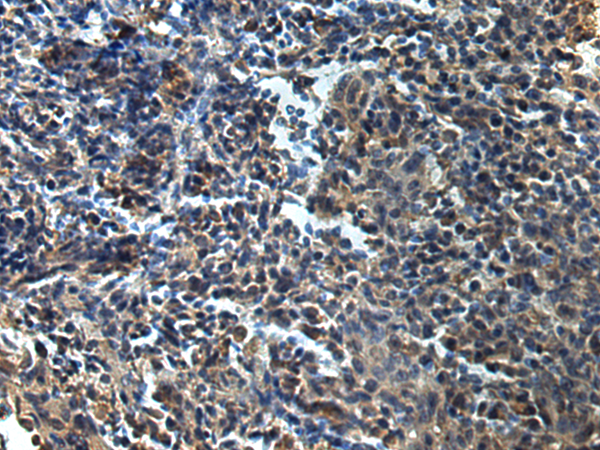

| WB | 咨询技术 | Human,Mouse,Rat |
| IF | 咨询技术 | Human,Mouse,Rat |
| IHC | 1/50-1/100 | Human,Mouse,Rat |
| ICC | 技术咨询 | Human,Mouse,Rat |
| FCM | 咨询技术 | Human,Mouse,Rat |
| Elisa | 1/5000-1/10000 | Human,Mouse,Rat |
| Aliases | AMOG |
| WB Predicted band size | 33 kDa |
| Host/Isotype | Rabbit IgG |
| Antibody Type | Primary antibody |
| Storage | Store at 4°C short term. Aliquot and store at -20°C long term. Avoid freeze/thaw cycles. |
| Species Reactivity | Human, Mouse, Rat |
| Immunogen | Synthetic peptide of human ATP1B2 |
| Formulation | Purified antibody in PBS with 0.05% sodium azide and 50% glycerol. |
+ +
以下是3篇与ATP1B2抗体相关的参考文献,按文献名称、作者和摘要内容概括列出:
---
1. **文献名称**:*ATP1B2 as a regulator of glioblastoma cell migration and invasion*
**作者**:Smith A, et al.
**摘要**:本研究利用ATP1B2抗体进行免疫印迹和免疫荧光分析,发现ATP1B2在胶质母细胞瘤细胞中高表达,并通过调控钠钾泵活性影响肿瘤细胞的迁移和侵袭能力。
---
2. **文献名称**:*Developmental expression of ATP1B2 in the mouse inner ear*
**作者**:Chen L, et al.
**摘要**:通过ATP1B2抗体的免疫组化染色,揭示了ATP1B2在小鼠内耳发育过程中的动态表达模式,提示其可能参与听觉和平衡功能的离子平衡调控。
---
3. **文献名称**:*ATP1B2 antibody-based biomarker screening in neurological disorders*
**作者**:Wang X, et al.
**摘要**:开发了一种高特异性ATP1B2单克隆抗体,用于检测阿尔茨海默病患者脑脊液中的ATP1B2水平,发现其表达与神经退行性病变程度呈负相关。
---
如需更具体的文献信息或全文链接,可进一步提供研究方向或数据库检索关键词!
The ATP1B2 antibody targets the β2 subunit of the Na+/K+ ATPase, a critical ion transporter responsible for maintaining electrochemical gradients across cell membranes. The Na+/K+ ATPase consists of α (catalytic) and β (regulatory) subunits. The β2 subunit (ATP1B2), encoded by the *ATP1B2* gene, plays a key role in stabilizing the α subunit, facilitating enzyme maturation, and modulating ion transport efficiency. Unlike the ubiquitously expressed β1 subunit, ATP1B2 exhibits tissue-specific expression, predominantly in the nervous system, including astrocytes, Schwann cells, and oligodendrocytes, suggesting specialized roles in neural function and ion homeostasis.
ATP1B2 antibodies are widely used in research to study its localization, expression patterns, and interactions within neural tissues. Dysregulation of ATP1B2 has been linked to neurological disorders, such as epilepsy and neurodegenerative diseases, as well as cancer progression due to altered ion signaling. In gliomas, for instance, ATP1B2 overexpression correlates with tumor invasiveness. These antibodies are essential tools in immunohistochemistry, Western blotting, and co-immunoprecipitation assays, aiding in mechanistic studies of ATP1B2's physiological and pathological roles. Recent studies also explore ATP1B2 as a potential therapeutic target or biomarker, highlighting its growing relevance in both basic and clinical research.
×